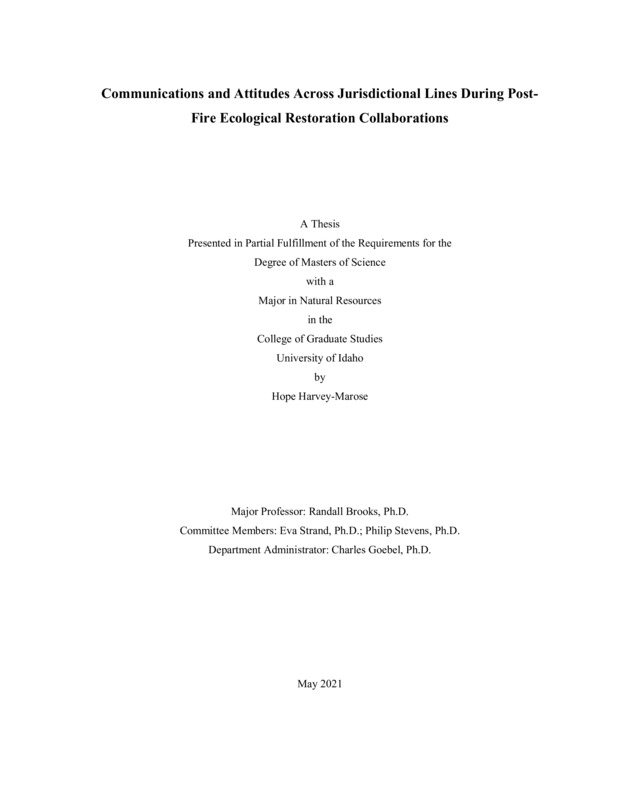Communications and Attitudes Across Jurisdictional Lines During Post-Fire Ecological Restoration Collaborations
Harvey-Marose, Hope. (2021-05). Communications and Attitudes Across Jurisdictional Lines During Post-Fire Ecological Restoration Collaborations. Theses and Dissertations Collection, University of Idaho Library Digital Collections. https://www.lib.uidaho.edu/digital/etd/items/harveymarose_idaho_0089n_12038.html
- Title:
- Communications and Attitudes Across Jurisdictional Lines During Post-Fire Ecological Restoration Collaborations
- Author:
- Harvey-Marose, Hope
- ORCID:
- 0000-0002-3209-5943
- Date:
- 2021-05
- Keywords:
- comanagement Interjurisdictional Wildland Urban Interface
- Program:
- Natural Resources
- Subject Category:
- Natural resource management
- Abstract:
-
Wildfire seasons are changing from a seasonal and typical management season to a year-round global problem. Magnifying this change is a dramatic uptick in uncharacteristic catastrophic wildfire trends. These fires are responsible for decreases in local wildlife populations worldwide and a multitude of other societal issues due to increases and redistribution of human populations resulting in an ever-expanding Wildland Urban Interface (WUI). In the United States there are multiple land management agencies working within differing ecological landscapes that manage wildfire and ecological restoration pre-and-post-wildfire. There are no overarching management rules for all agencies pertaining to post-fire ecological restoration aside from the National Environmental Policy Act (NEPA), so we examine what management gaps exist due to the patchwork of management across the United States. Our study analyzed survey data (n=80) from diverse employees involved in post-fire ecological restoration efforts. Survey participants include employees from state, federal, private, tribal and nongovernmental organizations. Our goal was to examine the attitudes and perceptions of each agency towards one another with respect to their fire management and restoration methods. We observed complicated results based on each agency’s unique perceptions, organizational ideologies, values and opinions about ecological restoration post-wildfire and how interjurisdictional fire events impact restoration and the decisions made during ecological restoration. The results suggest that despite many of these agencies being near or even next to one another or having overlapping collaboration efforts (meaning potentially being in close enough proximity to be on ecologically similar landscapes despite differing management methods) the methods used during post-wildfire ecological restoration vary depending on what jurisdiction a manager is currently working under. This complicates the restoration process during large-scale fire events. Further, the results suggest that the opinions of those surveyed in differing agencies can depend on what jurisdiction they currently belong to. Based on this research, we suggest multi-agency collaboration specifically with more frequent and/or effective communication that is specific to each agency’s needs. This will emphasize the importance of working across the landscape’s jurisdictional boundaries and accommodating each agency’s differing policies and goals within of times fragmented ecosystems.
- Description:
- masters, M.S., Natural Resources -- University of Idaho - College of Graduate Studies, 2021-05
- Major Professor:
- Brooks, Randall
- Committee:
- Strand, Eva; Stevens, Philip
- Defense Date:
- 2021-05
- Identifier:
- HarveyMarose_idaho_0089N_12038
- Type:
- Text
- Format Original:
- Format:
- application/pdf
- Rights:
- In Copyright - Educational Use Permitted. For more information, please contact University of Idaho Library Special Collections and Archives Department at libspec@uidaho.edu.
- Standardized Rights:
- http://rightsstatements.org/vocab/InC-EDU/1.0/

